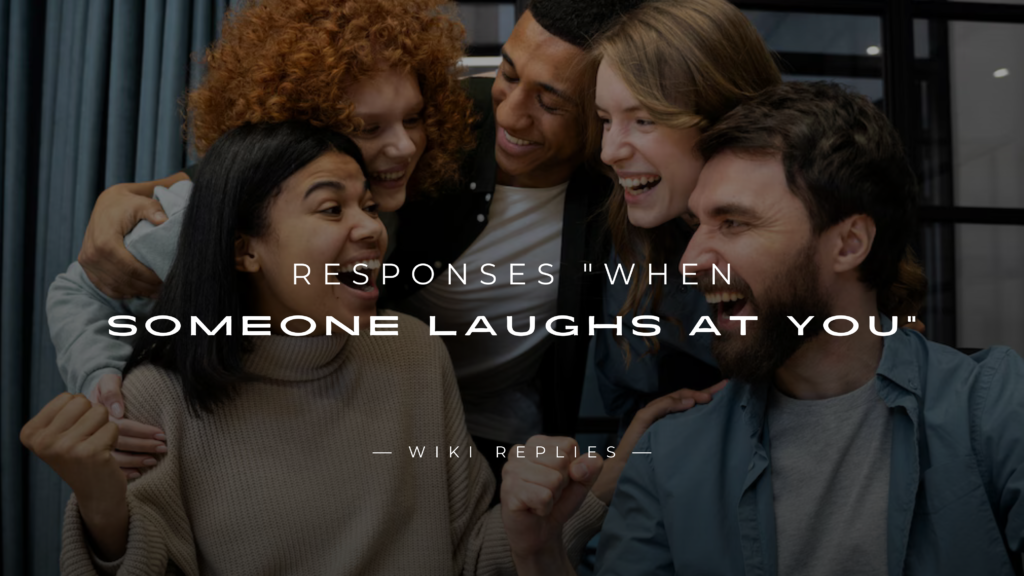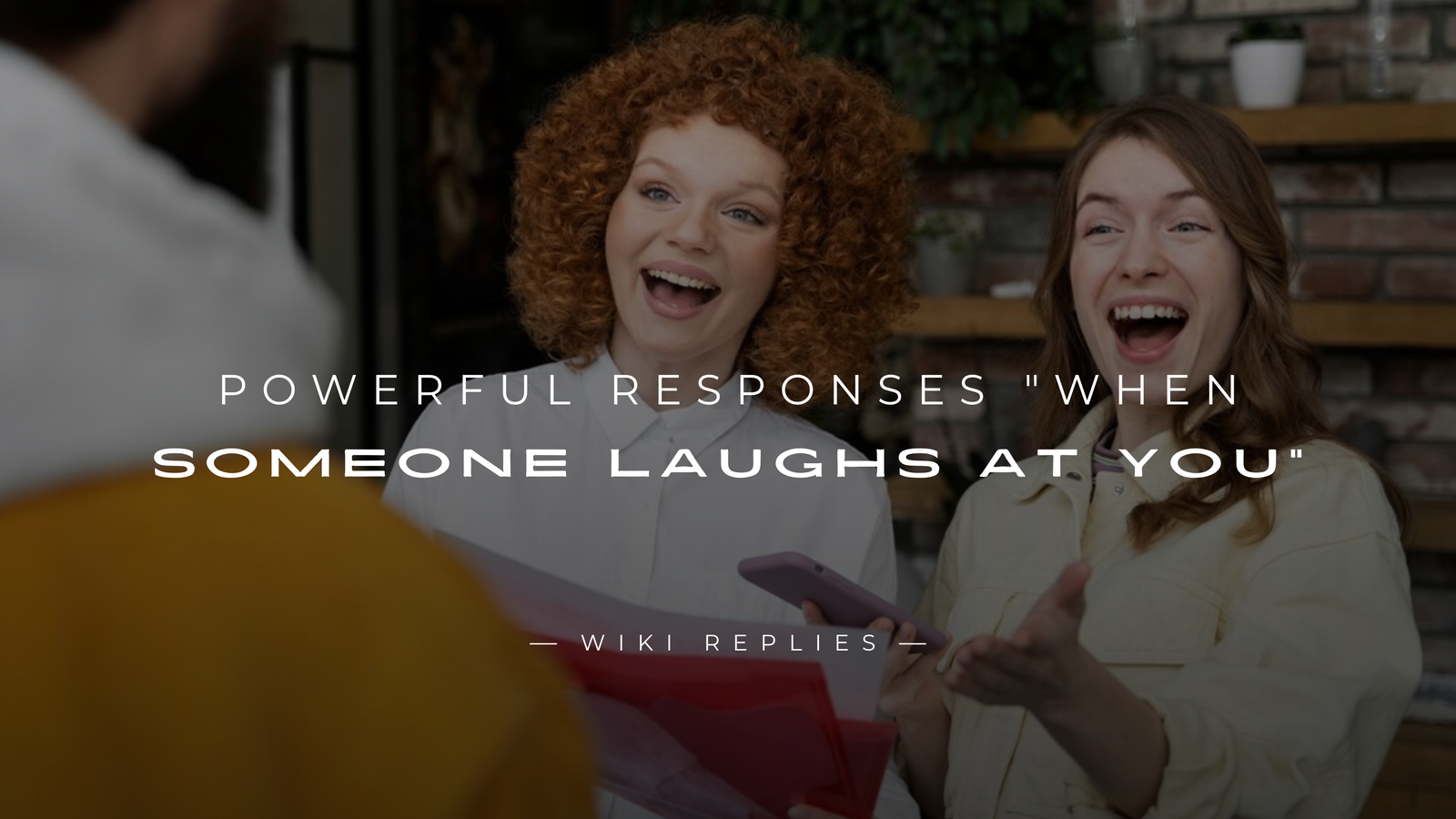Have you ever found yourself in an awkward situation where someone suddenly laughs at you? It can sting, right? Whether it’s an accidental slip-up or a moment of vulnerability, laughter at your expense can leave you feeling embarrassed, frustrated, or even hurt. But don’t worry—you’re not alone. In this article, we’ll explore how to respond when someone laughs at you and turn these uncomfortable moments into opportunities for growth.

220+ Responses “When Someone Laughs at You”
Confident Responses
- I’m glad I could make you laugh!
- Hey, if you’re laughing, I must be doing something right.
- I’m confident enough to not take it personally.
- You laugh, but I’m owning it.
- I’m totally fine with who I am, no worries.
- I must have a hidden talent for comedy.
- It’s okay, I’m comfortable with myself.
- Not everyone gets me, and that’s cool.
- I’m unbothered. Life’s too short to sweat the small stuff.
- It’s all good, I know my worth.
Humorous Responses
- Careful, or you’ll hurt yourself laughing that hard!
- I didn’t know I was auditioning for stand-up!
- At least someone finds me hilarious!
- Guess I’ve got a future in comedy!
- Wait, what? Was that my best joke of the day?
- I should start charging for these laughs!
- Well, I’m glad I could entertain.
- Hey, laughter is contagious! Keep it going!
- Should I take a bow or something?
- Oh, you think that was funny? Just wait, I’m on a roll today.
Empathetic Responses
- I didn’t mean to make you laugh, but I’m glad you found something funny.
- It sounds like something amused you, let’s talk about it.
- I understand, sometimes things come off differently than intended.
- It’s okay, I’m sure you didn’t mean to hurt my feelings.
- I know it wasn’t your intention, but laughing at me feels a little harsh.
- We’ve all been in situations like this, it’s okay.
- I’m sure there’s a reason you found it funny, let’s discuss it.
- I understand that everyone reacts differently, but I’d love to hear your thoughts.
- I can see you’re enjoying yourself. Just remember, I’m a person too.
- It’s all good, we can laugh about it together if you’d like.
Curious Responses
- What’s so funny? I’m genuinely curious.
- Can you tell me why you laughed? I want to understand.
- I’m interested in knowing what made you laugh.
- I didn’t catch the joke—mind filling me in?
- I’d love to know what’s so amusing!
- Did I miss something? What was funny about that?
- Is there a reason you laughed? I’m all ears.
- I’m not sure what part was funny, can you explain?
- I’d love to get your perspective on why that made you laugh.
- Help me out here—what was the joke?
Assertive Responses
- I don’t appreciate being laughed at.
- It’s not okay to laugh at people, and I’d appreciate some respect.
- I think it’s best if we keep the conversation respectful.
- That laugh felt a little disrespectful, can we keep it kind?
- I prefer we talk respectfully, rather than laugh at each other.
- I’m not sure why you’re laughing, but it’s making me uncomfortable.
- I didn’t find that reaction necessary. Let’s keep it civil.
- I’m here to communicate, not to be laughed at.
- If there’s an issue, we can talk about it instead of laughing.
- I’m asking for respect, not jokes at my expense.
Indifferent Responses
- Your laughter doesn’t affect me.
- That’s fine, laugh if you want.
- It’s cool, it doesn’t change anything for me.
- Laugh all you want, it doesn’t bother me.
- I’ve got better things to worry about.
- Everyone’s entitled to their opinion, I guess.
- It’s not really something I’m concerned about.
- You can laugh if it makes you feel better.
- Honestly, it doesn’t matter to me either way.
- Go ahead and laugh. I’m unfazed.
Defensive Responses
- Why are you laughing at me?
- That’s not funny, seriously.
- What’s so funny about what I said?
- I didn’t realize this was a joke to you.
- Are you making fun of me?
- There’s nothing funny here.
- What’s your problem?
- I don’t see why you’re laughing.
- That wasn’t meant to be funny.
- I don’t think this is something to laugh at.
Supportive Responses (for friends/family)
- It seems like you’re laughing at something I did—want to share what’s funny?
- I’m okay with a laugh, but let me know if I said something off.
- I can tell you’re laughing, but I’m here if you want to talk about what’s really going on.
- I hope I didn’t say anything that hurt you, let’s figure it out together.
- I didn’t mean to be funny, but I’m glad you’re smiling—what’s on your mind?
- I’m not sure what’s so funny, but let’s chat if something’s bothering you.
- It’s good to see you laugh, just let me know if there’s anything more behind it.
- I want to make sure we’re good—your laugh caught me off guard.
- You’re laughing, and that’s fine, but let’s check in and see how we’re both feeling.
- I appreciate that you can laugh, just want to make sure we’re on the same page.
Playful Responses
- Oh, I see how it is! Laughing at me, huh?
- If I knew I was this funny, I’d have taken up stand-up comedy!
- Wow, tough crowd! Let me try another joke.
- Hey, I wasn’t even trying to be funny yet!
- You think that’s funny? Just wait until I really get going!
- I’ll take that as a compliment—must’ve nailed that punchline!
- Oh, you’re laughing? I didn’t realize I was that hilarious!
- Come on, I wasn’t even trying, give me a chance to warm up!
- Is that laughter I hear? Guess I’m funnier than I thought!
- I’m clearly crushing it today—didn’t even try, and you’re already laughing!
Reflective Responses
- It’s interesting that you’re laughing—what part struck you as funny?
- I didn’t expect that reaction. Is there something I’m missing?
- I wonder what made that funny to you. Can we talk about it?
- Your laughter made me think—was it something I said or the way I said it?
- I didn’t realize it would come across that way—what do you think made it funny?
- That laugh surprised me. I’d like to understand your perspective.
- It’s curious how we see things differently. What’s making you laugh?
- I didn’t think that was a laughing moment. What’s your take on it?
- I wasn’t expecting that response. Want to unpack why it made you laugh?
- I’m reflecting on why this moment led to laughter. What’s your thought?
Positive Spin Responses
- At least I brought some laughter into your day!
- Hey, if you’re laughing, that’s a win for me!
- Laughter’s good for the soul, right? Glad I could help.
- If I made you laugh, I guess I’m doing something right!
- I’ll take laughter over silence any day!
- Well, if it made you laugh, I’m happy I could lighten the mood!
- Look at the bright side—we’re both smiling now!
- A little laughter never hurt anyone—glad to be part of it!
- Laughter means you’re in a good mood, and that’s great to see!
- If I can bring some humor into the moment, I’ll call that a success.
Dismissive Responses
- Whatever, doesn’t really matter.
- You can laugh if you want, doesn’t affect me.
- I’m not bothered, do what you want.
- It’s fine, I’ve got more important things to focus on.
- Think what you like, doesn’t change anything for me.
- Go ahead and laugh, doesn’t really make a difference.
- That’s your take, but I’m moving on.
- If laughing makes you feel better, cool. I’m over it.
- It’s not a big deal, let’s just move on.
- Laugh if you need to, I don’t really care.
Sarcastic Responses
- Oh, you’re so original—laughing at me, how clever.
- Wow, you must be a comedy genius!
- Oh, did I miss your stand-up routine? Should I clap now?
- Glad to see you’ve found your true calling in life—laughing at me.
- Oh, thank you for the laughter, I needed an ego boost.
- I didn’t realize I was in a comedy sketch. Should I be flattered?
- Oh, hilarious. Truly, you’ve got me in stitches.
- Oh yeah, laugh it up. You’re really breaking new ground here.
- Is that the best material you’ve got? I’m not impressed.
- Oh, sure, because laughing at me is the height of sophistication.
Vulnerable Responses
- Honestly, it stings a bit when you laugh at me like that.
- I’m not sure why you’re laughing, but it kind of hurts.
- It makes me feel small when you laugh at me.
- I know it might seem funny, but it’s making me feel embarrassed.
- It’s tough when I feel like the joke, can we talk about it?
- I’m trying my best, and your laughter makes me feel insecure.
- I didn’t mean to be funny, and it’s hard when it feels like I’m being laughed at.
- I wish you wouldn’t laugh, it’s making me feel uncomfortable.
- It’s hard not to take it personally when you laugh like that.
- Your laughter’s making me feel a little vulnerable. Can we discuss it?
Avoidant Responses
- Silence (just ignore and move on)
- Yeah, whatever. shrugs it off
- Let’s just move on.
- I don’t have time for this.
- Okay, anyway… change the subject
- You can laugh if you want. I don’t really care.
- Let’s not waste time on this, there’s more important stuff.
- I’m not interested in this conversation anymore.
- I don’t want to talk about it.
- It’s not worth discussing. Let’s just drop it.
Witty Responses
- Oh, is this my audition for Comedy Central?
- Glad I could be the highlight of your comedy special!
- I’m here all week—try the veal!
- Well, at least someone around here appreciates my humor.
- Hey, if I can make you laugh, I’ll consider my job done.
- Please, hold your applause until the end of the performance.
- I wasn’t even trying yet, just wait for the encore!
- Well, if laughing at me is your thing, you’re welcome!
- I’m flattered—didn’t know I had such comedic timing.
- Laugh all you want, I’m already laughing at how much rent I’m charging for that space in your head!
Educational Responses
- You know, laughing at people can sometimes make them feel alienated.
- There’s actually a difference between laughing with someone and laughing at them.
- It’s interesting—psychologists say we often laugh to cover up discomfort.
- Laughter can be a defense mechanism when people feel uncertain or insecure.
- Did you know that empathy is key in positive communication?
- Sometimes people use humor to avoid deeper conversations—have you thought about that?
- It’s important to think about how laughter impacts others—sometimes it can hurt.
- You might want to read up on how non-verbal cues, like laughter, can influence a situation.
- Humor is great, but it’s worth considering how it lands on the other person.
- There’s a lot of research on how laughter can build or break relationships. Which side do you want to be on?
Self-Deprecating Responses
- Guess I’m just here for comic relief!
- Hey, someone’s got to be the clown, right?
- Yeah, I probably deserve that one!
- Well, at least I’m good for a laugh!
- I’ve been working on my stand-up material, glad it’s paying off!
- I should start charging for all this entertainment!
- What can I say? I aim to amuse!
- Hey, if I can’t laugh at myself, who will?
- I always knew I’d be the butt of the joke one day!
- Yep, I’m a walking punchline, but at least I’m owning it!
Caring Responses
- I’m glad I made you laugh, but are we good? I want to make sure everything’s okay.
- I didn’t mean to make you laugh like that—did something I say come across wrong?
- Hey, I’m here for you if you need to talk about anything else. Laughter’s good, but so is understanding.
- If I made you laugh, I’m happy, but I just want to check in—how are you feeling?
- I’m all for some humor, but I want to make sure I didn’t hurt your feelings in any way.
- It’s great that you’re laughing, just making sure it’s all in good fun.
- You seem to be laughing, but if something’s bothering you, I’m here.
- I love seeing you smile—just checking, everything’s okay, right?
- It’s good to laugh, but if I said something out of line, I’d want to know.
- Your laughter means a lot to me, but if something else is on your mind, I’m all ears.
Confused Responses
- Wait, what’s so funny? I’m lost!
- I’m not sure I understand—what did I say that was funny?
- I didn’t catch the joke—did I miss something?
- What just happened? Why are you laughing?
- Wait, was that supposed to be funny? I’m a little confused.
- What am I missing here? Help me out!
- I didn’t realize that was a joke—can you explain what made you laugh?
- Hold on, what’s funny? I’m not following.
- I didn’t expect that reaction—can you fill me in?
- I’m genuinely confused—what part of that made you laugh?
Challenging Responses
- What’s so funny? Care to explain why you’re laughing at me?
- Is laughing at me really necessary right now?
- Do you think that’s an appropriate response?
- I’m curious—why do you feel the need to laugh in this situation?
- Does laughing at me make you feel better about something?
- You seem to be laughing—want to tell me what’s so amusing?
- I’m not sure I appreciate being laughed at. Want to discuss it?
- Is there a reason you’re laughing at me, or just having a good time?
- What’s going on? Are we laughing at me, or is there something else happening here?
- Do you think laughing at me is helping the situation in any way?
Philosophical Responses
- It’s funny how laughter can sometimes be a mask for deeper emotions.
- Isn’t it interesting how we all find different things amusing? Makes you wonder why.
- I’ve always believed that laughter reveals more about the person laughing than the subject.
- It’s curious how we use laughter to cope with situations that make us uncomfortable.
- Laughter is a universal language, but I wonder what it’s saying right now.
- Isn’t it fascinating how laughter can bring people together—or sometimes drive them apart?
- They say laughter is the best medicine, but I wonder if it’s always the right cure.
- Sometimes, I think we laugh to avoid confronting deeper truths about ourselves.
- Laughter can be such a complex reaction—what do you think it’s saying in this moment?
- It’s amazing how something as simple as laughter can carry so much meaning, isn’t it?
Understanding Why People Laugh at You
- The Psychology Behind Laughter
Laughter is a complex social reaction. It can be joyful, supportive, or unfortunately, sometimes hurtful. When someone laughs at you, it’s usually a reflection of their internal state, not yours. People often laugh to release tension, fill awkward silences, or because they feel insecure themselves. Understanding the difference between someone laughing with you and someone laughing at you is crucial in knowing how to respond effectively.
- Insecurity as a Trigger for Mocking
Often, when someone mocks or laughs at you, it stems from their own insecurities. People who feel inadequate or uncomfortable may project these feelings onto others, using laughter as a defense mechanism. Knowing this can help you feel less affected by their behavior because it’s really more about them than you.
Why It Hurts When Someone Laughs at You
- The Emotional Impact of Being Laughed At
Being laughed at can make you feel small and exposed. It’s natural to feel embarrassed, but that moment of laughter can linger long after it has passed. It can make you doubt yourself, feel isolated, or question your worth. This emotional reaction is deeply human; we all want to be accepted, and when someone laughs at us, it can feel like a rejection.
- How Laughter Affects Your Self-Esteem
Laughter directed at you can have a profound effect on your self-esteem, especially if it happens repeatedly. Over time, you might begin to doubt your abilities or develop social anxiety, fearing similar situations in the future. But the key is recognizing that these moments don’t define you—they are just brief experiences that you can overcome.
Effective Ways to Respond When Someone Laughs at You
- 1. Stay Calm and Composed
The first and most important thing to do when someone laughs at you is to stay calm. Reacting impulsively—whether through anger or embarrassment—can make things worse. Take a deep breath, remind yourself that their laughter doesn’t define you, and respond from a place of strength rather than defensiveness.
- 2. Assess the Situation
Before you react, assess the situation. Is the person laughing to mock you, or are they just trying to lighten the mood? Sometimes people laugh because they’re uncomfortable, not because they mean to hurt you. Understanding the context can help you decide the best way to respond.
- 3. Respond with Humor
One of the most powerful ways to defuse the tension when someone laughs at you is to laugh along with them. Using humor can shift the tone of the interaction, making it clear that you’re not taking things too seriously. A witty comeback or playful comment can turn an awkward moment into one of shared laughter.
For example, if you trip and someone laughs, you could say, “Graceful, right? I should be a professional dancer!” This not only breaks the tension but also shows that you’re confident enough to laugh at yourself.
- 4. Stand Up for Yourself
There are times when laughter crosses the line and becomes hurtful. In these cases, it’s essential to assert yourself. Calmly but firmly address the person laughing at you. You could say something like, “I didn’t find that funny, and I’d appreciate it if you stopped.” By standing up for yourself, you set boundaries and demonstrate self-respect.
- 5. Don’t Take It Personally
One of the hardest but most freeing responses is to not take the laughter personally. Recognize that people’s reactions are often influenced by factors that have nothing to do with you. Maybe they’re having a bad day, or they’re feeling insecure. By letting go of the need for their approval, you can maintain your peace of mind.
- 6. Walk Away When Necessary
Sometimes, the best response is no response at all. If someone is being intentionally hurtful, it’s okay to remove yourself from the situation. Walking away shows that you value your well-being over engaging in negative behavior.
Building Resilience Against Negative Reactions
- The Importance of Developing Thick Skin
Building emotional resilience is key to handling negative reactions like being laughed at. Developing thick skin doesn’t mean becoming emotionless—it means learning to filter out the noise and not let others’ opinions dictate your self-worth. Resilience helps you bounce back from tough situations with your confidence intact.
- Learning from the Experience
Every time someone laughs at you, there’s an opportunity to grow. Instead of internalizing the negativity, think about what you can learn from the situation. Did the person’s laughter reveal something about their character? Or maybe it showed you how to handle awkward moments with grace. Either way, use the experience to build your inner strength.
What to Avoid When Someone Laughs at You
- Don’t React with Anger
It’s easy to feel angry when someone laughs at you, but reacting with anger can escalate the situation. Instead of giving in to that frustration, try to stay composed. Anger often fuels the negativity, making you feel worse and giving the person more reason to laugh at you.
- Avoid Retaliating with Insults
When someone laughs at you, the temptation to retaliate with insults is strong. However, fighting fire with fire only intensifies the situation. By choosing not to stoop to their level, you maintain your dignity and rise above the negativity.
How to Deal with Laughter in Social Settings
- Navigating Group Dynamics
When laughter happens in a group setting, it can feel even more overwhelming. The key is to remain composed and not let the group’s laughter shake your confidence. If you can, turn the situation into a light-hearted moment by making a self-deprecating joke. This shows the group that you’re confident and comfortable with yourself.
- Addressing the Laughter Later
If someone’s laughter really bothered you, it’s okay to address it privately later on. Pull the person aside and let them know how their laughter made you feel. Most people aren’t aware of the impact their actions have, and a private conversation can lead to better understanding and future respect.
Building Confidence to Prevent Future Incidents
- Self-Empowerment Techniques
The best way to stop people from laughing at you in the future is to build inner confidence. When you carry yourself with self-assurance, it sends a clear message to others that you won’t be easily shaken. Practices like positive affirmations, meditation, and setting personal boundaries can help you stay grounded in your self-worth.
- Surrounding Yourself with Supportive People
Your environment plays a significant role in how you feel about yourself. Surround yourself with people who uplift and support you. A strong support system can make all the difference when dealing with moments of ridicule. These are the people who will remind you of your value, no matter what others say.
Conclusion
In conclusion, facing situations where someone laughs at you can be uncomfortable, but with the right responses, you can regain your confidence and handle the situation with grace. Whether you’re looking to stand your ground, defuse tension, or maintain your self-esteem, the 220+ responses we’ve provided offer a range of options to help you stay composed and in control. Remember, how you respond can change the dynamic and even turn a difficult moment into an opportunity for growth. If you’re also looking for more ways to navigate tricky social situations, check out our comprehensive guide on 220+ Responses to “I Hope You Feel Better” Messages here.
FAQs
Q. How do I respond if someone laughs at me for a mistake?
Respond with humor if you can. A light-hearted comment can ease tension and show you’re confident enough to laugh at yourself.
Q. What should I do if I feel deeply hurt by the laughter?
Take time to process your feelings and talk to a trusted friend. Sometimes, it helps to address the person privately if their laughter was particularly hurtful.
Q. How can I prevent people from laughing at me in the future?
Building self-confidence is key. When people see that you’re self-assured, they’re less likely to mock you. Assertiveness and setting boundaries also help.
Q. Is it okay to confront someone who laughs at me?
Yes, as long as you do it calmly and respectfully. Letting someone know how their laughter affected you can lead to better understanding.
Q. How can I learn to laugh at myself and not take things too seriously?
Practice self-compassion. Remember, everyone makes mistakes, and learning to laugh at yourself can make life’s awkward moments much more bearable.










